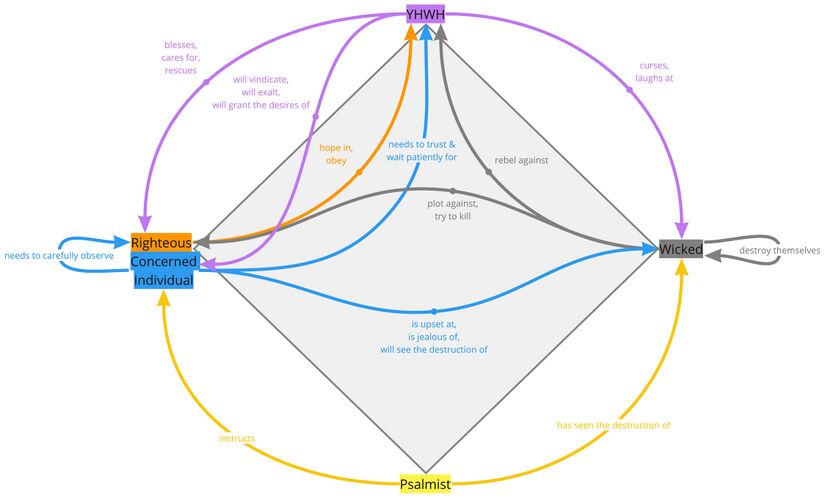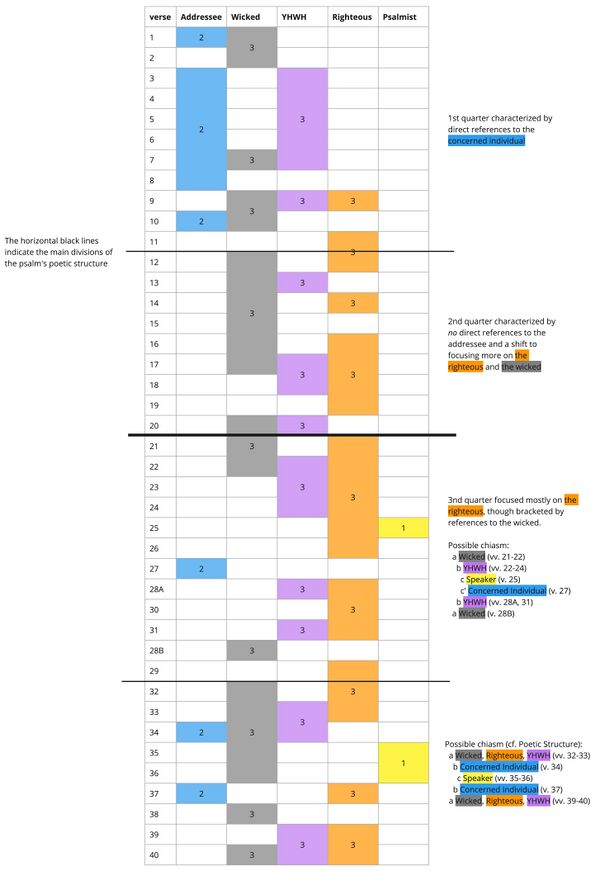Psalm 37 Participant Analysis
From Psalms: Layer by Layer
Psalm 37/Participant Analysis
Choose a PsalmNavigate Psalm 37
Guardian: Ryan Sikes
Participant Analysis
Participant Analysis focuses on the characters in the psalm and asks, “Who are the main participants (or characters) in this psalm, and what are they saying or doing? It is often helpful for understanding literary structure, speaker identification, etc.
For a detailed explanation of our method, see the Participant Analysis Creator Guidelines.
There are # participants/characters in Psalm 37:
Profile List
| David/Psalmist |
| Concerned individual |
| YHWH |
| "the Lord" (v. 13) |
| "the righteous person's God" (v. 31) |
| "the fortress of the righteous" (v. 39) |
| Wicked |
| "those who act wickedly" (vv. 1, 9) |
| "those who do wrong" (v. 1) |
| "someone who makes his way successful" (v. 7) |
| "a person carrying out schemes" (v. 7) |
| "the wicked (person)" [singular] (vv. 10, 12, 21, 32, 35) |
| "the wicked" [plural] (vv. 14, 16-17, 20, 28B, 34, 38, 40) |
| "YHWH's enemies" (v. 20) |
| "those cursed by YHWH" (v. 22) |
| "wrong-doers" (v. 28B) |
| "those who rebel" (v. 38) |
| Children of the wicked (v. 28b) |
| Righteous people |
| "those who hope in YHWH" (v. 9) |
| "the humble" (v. 11) |
| "the righteous (person)" [singular] (vv. 12, 16, 21, 25, 30, 32) |
| "the righteous" [plural] (vv. 17, 29, 39) |
| "one who is afflicted and poor" (v. 14) |
| "those whose conduct is upright" (v. 14) |
| "the blameless" (v. 18) |
| "those blessed by YHWH" (v. 22) |
| "person" in whose way YHWH delights (v. 23) |
| "YHWH's loyal ones" (v. 28a) |
| "blameless one" (v. 37) |
| "upright one" (v. 37) |
| Children of the righteous (vv. 25-26) |
Profile Notes
- The psalmist, identified in the superscription as "David" (v. 1), speaks throughout this psalm. At two points in the psalm he speaks in the first person and gives personal anecdotes (vv. 25, 35-36). The speaker is, apparently, an old man (v. 25) who has "seen it all" (note the verb רָאִיתִי in vv. 25, 35) and gives wisdom based on his experience.
- The concerned individual to whom the many second person singular forms refer (vv. 1-10, 27, 34, 37) is never explicitly described in the psalm. Nevertheless, based on the instruction given to him we can infer that this (idealized, hypothetical) addressee is a relatively young person (without the same lived experience as the speaker) who is deeply troubled by the apparent success of the wicked (see esp. vv. 1, 7-8, 10). We might imagine someone with the same attitude as that which Malachi describes: "You have said, 'It is vain to serve God. What is the profit of our keeping his charge or of walking as in mourning before the Lord of hosts? And now we call the arrogant blessed. Evildoers not only prosper but they put God to the test and they escape'" (Mal 3:14-15, ESV; cf. Ps 73).
- The righteous, according to Ps 37, are those who put their hope in YHWH (v. 9), i.e., who have sought shelter in him (v. 40). They have internalized YHWH's instruction (cf. v. 31), and so they live in a way that is blameless (v. 18) and upright (v. 14). Because living according to YHWH's instruction means being generous (cf. vv. 21, 26) and not joining the wicked in their quest for unjust gain, the righteous often become, in material terms, "afflicted and poor" (v. 14; cf. Ruiz 2009, 182-186). Even so, YHWH provides for them so that they always have enough (cf. v. 19).
- Also in view, at least peripherally, are the children of the righteous (vv. 25-26) and the children of the wicked (v. 28B, cf. v. 38b). Long life in the land implies descendants. For the righteous to possess the land and reside on it "forever" (v. 29, cf. v. 27), therefore, implies that they will have children and that their children will possess the land. Similarly, the utter destruction of the wicked and their removal from the land implies the cessation of their family line.
| Hebrew | Line | English |
|---|---|---|
| לְדָוִ֨ד | SS | By David. |
| אַל־תִּתְחַ֥ר בַּמְּרֵעִ֑ים | 1a | Do not get upset about those who act wickedly; |
| אַל־תְּ֝קַנֵּ֗א בְּעֹשֵׂ֥י עַוְלָֽה׃ | 1b | Do not be jealous of those who do wrong. |
| כִּ֣י כֶ֭חָצִיר מְהֵרָ֣ה יִמָּ֑לוּ | 2a | For they will soon wither like grass, |
| וּכְיֶ֥רֶק דֶּ֝֗שֶׁא יִבּוֹלֽוּן׃ | 2b | and they will fade like green leaves on plants. |
| בְּטַ֣ח בַּֽ֭יהוָה וַעֲשֵׂה־ט֑וֹב | 3a | Trust in YHWH and do good! |
| שְׁכָן־אֶ֝֗רֶץ וּרְעֵ֥ה אֱמוּנָֽה׃ | 3b | Reside in the land and graze securely! |
| וְהִתְעַנַּ֥ג עַל־יְהוָ֑ה | 4a | And then you will delight yourself in YHWH, |
| וְיִֽתֶּן־לְ֝ךָ֗ מִשְׁאֲלֹ֥ת לִבֶּֽךָ׃ | 4b | and he will give you your heart's desires. |
| גּ֣וֹל עַל־יְהוָ֣ה דַּרְכֶּ֑ךָ | 5a | Commit your way to YHWH, |
| וּבְטַ֥ח עָ֝לָ֗יו וְה֣וּא יַעֲשֶֽׂה׃ | 5b | and trust in him, and he will act, |
| וְהוֹצִ֣יא כָא֣וֹר צִדְקֶ֑ךָ | 6a | and he will make your righteousness known like the light, |
| וּ֝מִשְׁפָּטֶ֗ךָ כַּֽצָּהֳרָֽיִם׃ | 6b | and [he will make] your justice [known] like midday. |
| דּ֤וֹם ׀ לַיהוָה֮ וְהִתְח֪וֹלֵ֫ל ל֥וֹ | 7a | Be silent before YHWH and wait for him! |
| אַל־תִּ֭תְחַר בְּמַצְלִ֣יחַ דַּרְכּ֑וֹ | 7b | Do not get upset about someone who makes his way successful, |
| בְּ֝אִ֗ישׁ עֹשֶׂ֥ה מְזִמּֽוֹת׃ | 7c | about a person carrying out schemes. |
| הֶ֣רֶף מֵ֭אַף וַעֲזֹ֣ב חֵמָ֑ה | 8a | Let go of anger and leave wrath behind! |
| אַל־תִּ֝תְחַ֗ר אַךְ־לְהָרֵֽעַ׃ | 8b | Do not get upset only to act wickedly! |
| כִּֽי־מְ֭רֵעִים יִכָּרֵת֑וּן | 9a | For those who act wickedly will be destroyed; |
| וְקֹוֵ֥י יְ֝הוָ֗ה הֵ֣מָּה יִֽירְשׁוּ־אָֽרֶץ׃ | 9b | but those who hope in YHWH—they will possess the land. |
| וְע֣וֹד מְ֭עַט וְאֵ֣ין רָשָׁ֑ע | 10a | And just a little bit longer, and the wicked person will be gone; |
| וְהִתְבּוֹנַ֖נְתָּ עַל־מְקוֹמ֣וֹ וְאֵינֶֽנּוּ׃ | 10b | And you will look closely at the place where he was, and he will not be |
| וַעֲנָוִ֥ים יִֽירְשׁוּ־אָ֑רֶץ | 11a | But the humble will possess the land |
| וְ֝הִתְעַנְּג֗וּ עַל־רֹ֥ב שָׁלֽוֹם׃ | 11b | and delight themselves in great prosperity. |
| זֹמֵ֣ם רָ֭שָׁע לַצַּדִּ֑יק | 12a | The wicked person is plotting against the righteous person |
| וְחֹרֵ֖ק עָלָ֣יו שִׁנָּֽיו׃ | 12b | and grinding his teeth at him. |
| אֲדֹנָ֥י יִשְׂחַק־ל֑וֹ | 13a | The Lord laughs at him, |
| כִּֽי־רָ֝אָ֗ה כִּֽי־יָבֹ֥א יוֹמֽוֹ׃ | 13b | because he sees that his time will come. |
| חֶ֤רֶב ׀ פָּֽתְח֣וּ רְשָׁעִים֮ | 14a | The wicked have drawn swords |
| וְדָרְכ֪וּ קַ֫שְׁתָּ֥ם | 14b | and strung their bows |
| לְ֭הַפִּיל עָנִ֣י וְאֶבְי֑וֹן | 14c | in order to bring down the one who is afflicted and poor, |
| לִ֝טְב֗וֹחַ יִשְׁרֵי־דָֽרֶךְ׃ | 14d | in order to slaughter those whose conduct is upright. |
| חַ֭רְבָּם תָּב֣וֹא בְלִבָּ֑ם | 15a | Their swords will go into their hearts, |
| וְ֝קַשְּׁתוֹתָ֗ם תִּשָּׁבַֽרְנָה׃ | 15b | and their bows will be broken. |
| טוֹב־מְ֭עַט לַצַּדִּ֑יק | 16a | A little belonging to the righteous person is better |
| מֵ֝הֲמ֗וֹן רְשָׁעִ֥ים רַבִּֽים׃ | 16b | than the abundance of many wicked people. |
| כִּ֤י זְרוֹע֣וֹת רְ֭שָׁעִים תִּשָּׁבַ֑רְנָה | 17a | For the arms of the wicked will be broken, |
| וְסוֹמֵ֖ךְ צַדִּיקִ֣ים יְהוָֽה׃ | 17b | but YHWH is upholding the righteous. |
| יוֹדֵ֣עַ יְ֭הוָה יְמֵ֣י תְמִימִ֑ם | 18a | YHWH knows the days of the blameless, |
| וְ֝נַחֲלָתָ֗ם לְעוֹלָ֥ם תִּהְיֶֽה׃ | 18b | and their inheritance will be forever. |
| לֹֽא־יֵ֭בֹשׁוּ בְּעֵ֣ת רָעָ֑ה | 19a | They will not come to shame during hard times, |
| וּבִימֵ֖י רְעָב֣וֹן יִשְׂבָּֽעוּ׃ | 19b | and they will eat their fill during times of famine. |
| כִּ֤י רְשָׁעִ֨ים ׀ יֹאבֵ֗דוּ וְאֹיְבֵ֣י | 20a | For the wicked will perish, and s enemies |
| יְ֭הוָה כִּיקַ֣ר כָּרִ֑ים כָּל֖וּ בֶעָשָׁ֣ן כָּֽלוּ׃ | 20b | YHWH's [will perish] like flowers in a pasture. They are finished like smoke! They are finished! |
| לֹוֶ֣ה רָ֭שָׁע וְלֹ֣א יְשַׁלֵּ֑ם | 21a | The wicked person is borrowing and will not repay, |
| וְ֝צַדִּ֗יק חוֹנֵ֥ן וְנוֹתֵֽן׃ | 21b | but the righteous person is giving generously. |
| כִּ֣י מְ֭בֹרָכָיו יִ֣ירְשׁוּ אָ֑רֶץ | 22a | For those blessed by him will possess the land, |
| וּ֝מְקֻלָּלָ֗יו יִכָּרֵֽתוּ׃ | 22b | and those cursed by him will be destroyed. |
| מֵ֭יְהוָה מִֽצְעֲדֵי־גֶ֥בֶר כּוֹנָ֗נוּ | 23a | a person's steps are made steadfast by YHWH, |
| וְדַרְכּ֥וֹ יֶחְפָּֽץ׃ | 23b | then he will be pleased with his way. |
| כִּֽי־יִפֹּ֥ל לֹֽא־יוּטָ֑ל כִּֽי־ | 24a | When he falls, he will not fall flat. because |
| יְ֝הוָ֗ה סוֹמֵ֥ךְ יָדֽוֹ׃ | 24b | YHWH is supporting his hand. |
| נַ֤עַר ׀ הָיִ֗יתִי גַּם־זָ֫קַ֥נְתִּי | 25a | I was once a young man; and now I am old, |
| וְֽלֹא־רָ֭אִיתִי צַדִּ֣יק נֶעֱזָ֑ב וְ֝זַרְע֗וֹ מְבַקֶּשׁ־לָֽחֶם׃ | 25b | and I have not seen a righteous person abandoned or his children looking for food. |
| כָּל־הַ֭יּוֹם חוֹנֵ֣ן | 26a | always is lending generously, |
| וּמַלְוֶ֑ה וְ֝זַרְע֗וֹ לִבְרָכָֽה׃ | 26b | and his children will become a blessing. |
| ס֣וּר מֵ֭רָע וַעֲשֵׂה־ט֗וֹב | 27a | Turn away from evil and do good, |
| וּשְׁכֹ֥ן לְעוֹלָֽם׃ | 27b | and you will reside forever! |
| כִּ֤י יְהוָ֨ה ׀ אֹ֘הֵ֤ב מִשְׁפָּ֗ט וְלֹא־יַעֲזֹ֣ב אֶת־חֲ֭סִידָיו | *28a | For YHWH loves justice, and he will not abandon those who are loyal to him. |
| פִּֽי־צַ֭דִּיק יֶהְגֶּ֣ה חָכְמָ֑ה וּ֝לְשׁוֹנ֗וֹ תְּדַבֵּ֥ר מִשְׁפָּֽט׃ | *30 | A righteous person's mouth utters what is wise, and his tongue speaks what is just. |
| תּוֹרַ֣ת אֱלֹהָ֣יו בְּלִבּ֑וֹ לֹ֖א תִמְעַ֣ד אֲשֻׁרָיו׃ | *31 | The instruction of his God is in his heart. His steps will not slip. |
| עַוָלִים נִשְׁמָדו וְזֶ֖רַע רְשָׁעִ֣ים נִכְרָֽת׃ | *28b | Wrong-doers are exterminated, and the children of the wicked are destroyed! |
| צַדִּיקִ֥ים יִֽירְשׁוּ־אָ֑רֶץ וְיִשְׁכְּנ֖וּ לָעַ֣ד עָלֶֽיהָ׃ | *29 | The righteous will possess the land and reside on it forever. |
| צוֹפֶ֣ה רָ֭שָׁע לַצַּדִּ֑יק וּ֝מְבַקֵּ֗שׁ לַהֲמִיתוֹ׃ | 32 | The wicked person is watching for the righteous person and trying to kill him. |
| יְ֭הוָה לֹא־יַעַזְבֶ֣נּוּ בְיָד֑וֹ וְלֹ֥א יַ֝רְשִׁיעֶ֗נּוּ בְּהִשָּׁפְטֽוֹ׃ | 33 | YHWH will not abandon him into his hand, and he will not let him be condemned as guilty when he enters into judgment. |
| קַוֵּ֤ה אֶל־יְהוָ֨ה ׀ וּשְׁמֹ֬ר דַּרְכּ֗וֹ וִֽ֭ירוֹמִמְךָ לָרֶ֣שֶׁת אָ֑רֶץ בְּהִכָּרֵ֖ת רְשָׁעִ֣ים תִּרְאֶֽה׃ | 34 | Hope in YHWH and keep his way, and he will exalt you to possess the land. You will see when the wicked are destroyed. |
| רָ֭אִיתִי רָשָׁ֣ע עָרִ֑יץ וּ֝מִתְעָרֶ֗ה כְּאֶזְרָ֥ח רַעֲנָֽן׃ | 35 | I once saw a ruthless wicked person, and he was ascending like a native tree. |
| וָאֶעֲבֹר וְהִנֵּ֣ה אֵינֶ֑נּוּ וָֽ֝אֲבַקְשֵׁ֗הוּ וְלֹ֣א נִמְצָֽא׃ | 36 | Then I passed by, and—get this!—he was gone; then I looked for him, and he was not found. |
| שְׁמָר־תָּ֭ם וּרְאֵ֣ה יָשָׁ֑ר כִּֽי־אַחֲרִ֖ית לְאִ֣ישׁ שָׁלֽוֹם׃ | 37 | Pay attention to the blameless one and look at the upright one, because the future of a[blameless] person is peace. |
| וּֽ֭פֹשְׁעִים נִשְׁמְד֣וּ יַחְדָּ֑ו אַחֲרִ֖ית רְשָׁעִ֣ים נִכְרָֽתָה׃ | 38 | But those who rebel are completely exterminated! The future of the wicked is destroyed! |
| וּתְשׁוּעַ֣ת צַ֭דִּיקִים מֵיְהוָ֑ה מָֽ֝עוּזָּ֗ם בְּעֵ֣ת צָרָֽה׃ | 39 | But the salvation of the righteous comes from YHWH, their fortress during times of trouble, |
| וַֽיַּעְזְרֵ֥ם יְהוָ֗ה וַֽיְפַ֫לְּטֵ֥ם יְפַלְּטֵ֣ם מֵ֭רְשָׁעִים וְיוֹשִׁיעֵ֑ם כִּי־חָ֥סוּ בֽוֹ׃ | 40 | and YHWH helps them and rescues them. He will rescue them from the wicked and save them, because they have sought refuge in him. |
- *Emendations*:
- v. 20: For the emendation כֶעָשָׁן, see Grammar (MT: בֶעָשָׁ֣ן).
- v. 28B: For the emendation עַוָּלִים נִצְמָתוּ, see The Text of Psalm37:28.
- vv. 28-31: For the rearrangement of the strophes/letters, see Poetic Structure.
- v. 36: For the emendation וָאֶעֲבֹר, see Grammar (MT: וַ֭יַּֽעֲבֹר).
- v. 22: YHWH?
- The referent of the pronominal suffixes in v. 22 is not immediately clear. Up to this point, the strophe (vv. 21-22) has only mentioned the righteous and the wicked, but it does not make sense for either of them to be the referent. The suffixes must refer to YHWH, even though he has not yet been mentioned in this strophe (so NIV, NLT, ESV, CEV, GNT, JPS1917, NET, LUT, HFA, NGÜ, GNB). Echoes of Gen 12:3 (cf. Hossfeld and Zenger 1993, 293) and the blessings and curses of Deuteronomy (cf. Craigie 1983, 298) support this identification.
- v. 23: On the participants in v. 23b, see lexical semantics.
- v. 38b: future or children of the wicked?
- It is difficult to know whether the word "future" (אַחֲרִית) refers to the children of the wicked (NRSV, NASB: "posterity"; GNT: "their descendants"). See note on lexical semantics. At the very least, children are implied. Cf. parallel in v. 28B.
Participant Relations Diagram
The relationships among the participants may be abstracted and summarized as follows:




